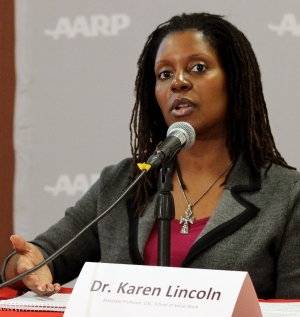Lincoln Speaks About State Ballot Measures at Election Forum
October 29, 2012 / by Vincent Lim- Research
With the upcoming election only days away, a public event was held at the EXPO Center in Exposition Park to help older voters better understand and become more informed about this year’s California statewide ballot measures.
Karen Lincoln, an associate professor at the USC School of Social Work and the associate director of the USC Edward R. Roybal Institute on Aging, was one of three expert panelists who spoke at the AARP-organized forum that examined how four tax initiatives on the ballot may impact the lives of older adults.
Propositions 30, 31, 38 and 39 were all addressed throughout the event, but much of the discussion and many of the questions directed at the panel dealt with the dueling tax initiatives, Proposition 30 and Proposition 38.
Lincoln noted that none of the propositions explicitly described how the revenue generated from the propositions could be used to help fund or forestall cuts to programs that benefit the elderly.
“Seniors are completely lost in this conversation,” Lincoln said.
Funding for services for the elderly is critically important for Los Angeles County, which has the largest number of older adults of any county in the entire state of California.
Passing Proposition 30 would temporarily increase the state sales tax rate for all taxpayers for four years and the personal income tax rates for upper-income taxpayers for seven years to help close California’s $16 billon budget deficit. The measure is projected to raise $6 billion to $9 billion in state revenue. The majority of tax revenues would go to education, but a smaller portion would end up in the state’s general fund.
“Millions upon millions of dollars have been cut for services for seniors, and there’s no discussion about how that general fund money will be used for restoring some of those services,” Lincoln said.
In the wake of the recession, the state government has cut funding for various programs and attempted to eliminate adult day health care and caregiver resource centers.
Proposition 38 would raise personal income taxes on most California taxpayers in 2013 through 2024. The measure is projected to raise $10 billion for the state, but the new revenue must be spent on public schools, child care and preschool programs, and paying off state debt.
The panelists expressed some reservations about both propositions, but agreed the revenue accrued from Proposition 30 had a greater possibility of helping to fund services for older adults.
“If you look at the tax benefits, my sense would be that 30 is more likely to benefit senior services,” said Steve Wallace, chair of the UCLA Department of Community Health Sciences and associate director of the UCLA Center for Health Policy Research. “The way 38 is structured, it can only go to a trust fund for education.”
Tom Carson, the treasurer of the League of Women Voters of California, added that any sort of additional state revenue is beneficial in the long run, even if it is not earmarked for a particular purpose.
“While it goes to education, it has the side effect—the way the budget works—of relieving the state general fund of certain kinds of expenditures, which allows the general fund to pay for other things like senior services or the courts or a lot of other things that our society needs,” Carson said.
The general fund supports many public programs including public education, health programs and social services. Education spending accounts for the largest percentage of the state budget, so providing robust funding for schools will allow more general fund money to go to other services.
Though education funding may not seem to be an issue that would directly impact older adults, the panelists underscored the need for aging Californians to look to the future.
“The people being educated today are going to be buying your house,” Wallace said. “Houses are the No. 1 asset of most seniors in this country.”
As people grow older, studies show that many individuals choose to sell their larger homes and downsize to smaller houses.
“These are not only the people who will be buying your home, but they will be the people who will be providing services for you,” Lincoln added.
If voters approve both Proposition 30 and Proposition 38 on the statewide ballot, the measure that receives the most votes will prevail in the end, and its provisions will go into effect in the next budget cycle.
The panelists closed by imploring the audience to remember to make educated decisions and to vote.
“At the end of the day, my thing is vote,” Lincoln said. “Exercise your right to vote…but be informed.”
The event was co-sponsored by AARP, the League of Women Voters and the Los Angeles Aging Advocacy Coalition. Val Zavala, vice president of news and public affairs at KCET, moderated the panel.
To reference the work of our faculty online, we ask that you directly quote their work where possible and attribute it to "FACULTY NAME, a professor in the USC Suzanne Dworak-Peck School of Social Work” (LINK: https://dworakpeck.usc.edu)
